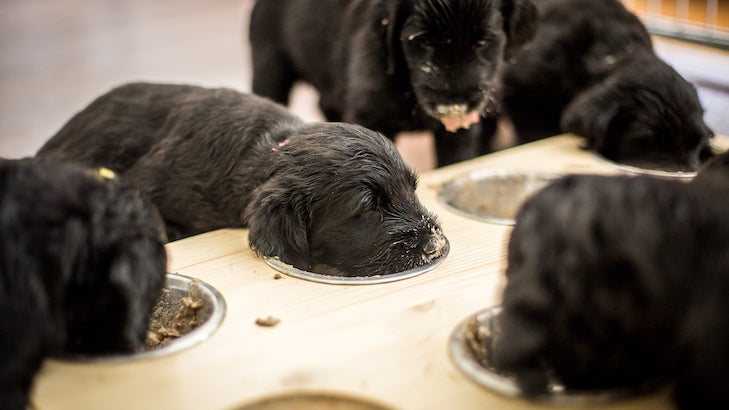
Got “milk teeth,” now bring on the puppy food.
Rapidly growing puppies tend to be eager eaters. Not surprising considering that until they are around six months of age, puppies need two to three times the amount of most nutrients and calories per pound of body weight compared to an adult dog.
Choosing Puppy’s First Food
A puppy’s first food, generally introduced at three to four weeks of age, should provide complete and balanced nutrition and be formulated to meet the nutrient requirements of growing puppies. “Essential nutrients—protein, fat, carbohydrates, minerals, and vitamins—must be present in the proper proportions to ensure a puppy food is complete and balanced,” says Melinda Fleming, DVM, Purina Research Scientist. “A supply of fresh water must be available at all times.”
Puppies, even litters, should be fed on an individual basis, Fleming says. “It is important to feed a food that matches the energy needs of puppies and thus provides steady, optimal growth. Puppies should be fed an appropriate amount of calories that supports normal growth but not excessive growth.”
This is especially important for large- and giant-breed dogs that may be predisposed to developmental orthopedic conditions. Avoiding overfeeding and excessive weight may help their development, as they have a higher growth rate than smaller breeds and should be fed a lower energy growth diet for a longer period of time. In contrast, toy- and small-breed puppies puppies may mature before 1 year of age and have an increased energy need relative to their body weight.
“When choosing a puppy food, look for one on which feeding trials have been conducted,” Fleming advises. “At Purina, we conduct feeding trials on all our puppy foods. It also is a good idea to discuss the calorie requirements of puppies with your veterinarian.”
Feed the Dam First
Giving puppies a good nutritional start in life begins with properly feeding the pregnant bitch. Her energy requirements increase about 10 percent a week from week six through nine of pregnancy, thus it is especially important to meet those energy needs. Here are tips on nutrition for pregnant bitches.
Pregnant bitches should be fed a high-quality, complete-and-balanced adult maintenance dog food until week six, then transitioned to a highly digestible, energy- and nutrient-dense puppy or performance dog food from week six through lactation.
Due to the increased size of fetuses, a bitch’s digestive tract has limited room to expand after each meal. It helps to split food into several meals. Fetuses put on 75 percent of their body weight in the last trimester.
Excessive weight gain and obesity in pregnant bitches can cause large fetal birth weight and less effective uterine contractions during labor, leading to dystocia (difficulty birthing). Without a C-section, you could lose the bitch and puppies.
The first 72 hours are nutritionally critical for puppies. They rely entirely on the dam’s first milk, colostrum, to receive highly concentrated energy and nutrients, passive immunity and growth factors. Colostrum protects the newborn puppy during the first 10 to 12 weeks of life.


